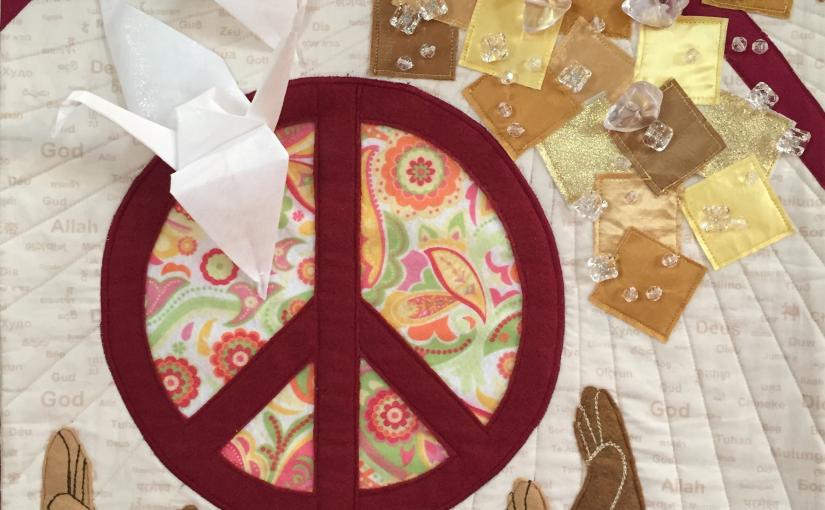No Justice, No Peace
Author: Karen Hoover
Throughout this summer, and again this very week, we have heard across our land the cry “No justice, no peace” at hundreds of peaceful protests for racial justice. This led me to reflect on our congregation’s Just Peace Covenant adopted 30 years ago. The covenant affirms our commitment as Christians to work for peace and our conviction that without justice for all there can be no peace.
In 2017 the McMane Arts Ministry received a commission to create six communion table frontals to celebrate each of the congregation’s covenants and to serve as reminders in worship of our covenant commitments. It was my privilege to be entrusted to create our Just Peace frontal.
My biblical inspiration was the declaration in Matthew 5:13-16, in the verses immediately following the Beatitudes. Here, Jesus tells us “You are the salt of the earth” and “You are the light of the world,” represented on the frontal as refracted light and grains of salt being cast on the peace symbol created in 1958 (for the Campaign for Nuclear Disarmament). Beyond being a basic organic requirement of life, salt is both a seasoning or a food preservative, as well as a painful irritant or a healing agent. Salt is also present in the tears we shed in sorrow and compassion for ourselves, others, and the world. Our light is the radiant light of God’s love which shines through us as love for all people, as voices for justice, and as laborers for actions that “move the needle” toward justice. It is the beacon that pierces the darkness to illuminate injustice.
Holding these symbols are the intertwined hands of those upon whom God has bestowed the responsibility to create the just world in which peace will be achieved. Origami cranes commemorate our congregation’s 1,000 cranes for peace project and their beautiful installation in the soaring beams of our sanctuary in 2015, and in the Kevin Box sculpture gracing our entrance.
What does it mean to be “salt and light” in creating justice and peace in the troubled year of 2020? It means allowing ourselves to really see and listen to the experiences of others—their joy, pain, anguish, anger, desperation and fear. It means learning about and acknowledging to ourselves and to each other that we benefit from a system of laws, procedures, social conventions, and enforcement that institutionalizes poverty and racial injustice. It means activating ourselves to move beyond empathy to action—to advocate for and even to demand justice with our voices, hands and feet and with our resources. It means nurturing our faithful belief in love and hope and building the beloved community while resisting the easy paths of cynicism and judgment. In short, endeavoring to be the Christians we claim to be. And after all these centuries, and decades too, picking up the pace of our witness.
Gracious God, you set me on my life path as a believer. You sent Jesus to teach me your ways. Guide me always in the work for justice and peace. Amen.


